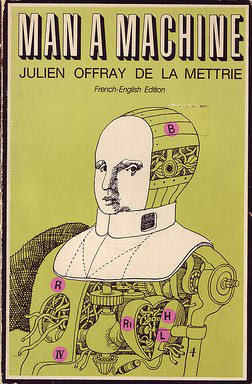Jeffrey Herf: Reactionary Modernism: Technology, Culture, and Politics in Weimar and the Third Reich (1985)
Filed under book | Tags: · engineering, enlightenment, fascism, germany, marxism, modernism, national socialism, nationalism, nazism, politics, romanticism, technology, weimar republic

“In a unique application of critical theory to the study of the role of ideology in politics, Jeffrey Herf explores the paradox inherent in the German fascists’ rejection of the rationalism of the Enlightenment while fully embracing modern technology. He documents evidence of a cultural tradition he calls ‘reactionary modernism’ found in the writings of German engineers and of the major intellectuals of the Weimar right: Ernst Juenger, Oswald Spengler, Werner Sombart, Hans Freyer, Carl Schmitt, and Martin Heidegger. The book shows how German nationalism and later National Socialism created what Joseph Goebbels, Hitler’s propaganda minister, called the ‘steel-like romanticism of the twentieth century’. By associating technology with the Germans, rather than the Jews, with beautiful form rather than the formlessness of the market, and with a strong state rather than a predominance of economic values and institutions, these right-wing intellectuals reconciled Germany’s strength with its romantic soul and national identity.”
Publisher Cambridge University Press, 1985
ISBN 0521338336, 9780521338332
251 pages
Reviews: R.J. Overy (English Historical Review), Geoff Eley (Telos).
Commentary: Thomas Rohkraemer (Contemporary European History).
Peter Sloterdijk: You Must Change Your Life: On Anthropotechnics (2009/2012)
Filed under book | Tags: · anthropology, anthropotechnics, christianity, education, enlightenment, history of philosophy, modernity, philosophy, religion

“In his major investigation into the nature of humans, Peter Sloterdijk presents a critique of myth – the myth of the return of religion. For it is not religion that is returning; rather, there is something else quite profound that is taking on increasing significance in the present: the human as a practising, training being, one that creates itself through exercises and thereby transcends itself. Rainer Maria Rilke formulated the drive towards such self-training in the early twentieth century in the imperative ‘You must change your life’.
In making his case for the expansion of the practice zone for individuals and for society as a whole, Sloterdijk develops a fundamental and fundamentally new anthropology. The core of his science of the human being is an insight into the self-formation of all things human. The activity of both individuals and collectives constantly comes back to affect them: work affects the worker, communication the communicator, feelings the feeler.
It is those humans who engage expressly in practice that embody this mode of existence most clearly: farmers, workers, warriors, writers, yogis, rhetoricians, musicians or models. By examining their training plans and peak performances, this book offers a panorama of exercises that are necessary to be, and remain, a human being.”
First published in German as Du mußt dein Leben ändern, Suhrkamp, Frankfurt am Main, 2009.
Translated by Wieland Hoban
Publisher Polity Press, 2012
ISBN 0745649211, 9780745649214
500 pages
review (Keith Ansell-Pearson, LA Review of Books)
review (Michael Hübl, Metropolis M)
commentary (Bruce Sterling, Wired)
commentary (Sanne van der Hout)
Julien Offray de La Mettrie: Man a Machine (1747-) [FR, EN, TR, DE, PL]
Filed under book | Tags: · body, enlightenment, machine, materialism, philosophy

French physician and Enlightenment thinker Julien Offray de La Mettrie (1709–51) was the most uncompromising of the materialists of the eighteenth century, and the provocative title of his work ensured it a succès de scandale in his own time.
“In 1747, La Mettrie wrote a small but powerful book arguing that the soul, the human will, and consciousness were all reducible to bodily processes. According to La Mettrie, ‘The human body is a machine which winds its own springs.’
La Mettrie’s L’homme machine (Man a Machine or Machine Man) was likely completed in August of 1747. The book was controversial, arguing against the traditional notion of soul and suggesting that man was no different than any other animal. This small volume espousing this materialist philosophy was just over one hundred pages long, written in forceful but casual prose. Less than half a year after its publication, the book became the center of controversy and led to La Mettrie’s self-exile from Holland.
The book was printed anonymously and copies were circulating in Holland by December. On December 18th, the publisher—Elie Luzac—was called before the Consistory Church of Leyden and ordered to deliver all copies of the book for burning and to promptly reveal the author. The publisher indeed delivered some copies for burning, but claimed he did not know who had written the piece. The following year, the publisher issued two more printings of the book and then promptly left Holland.
In the meantime, rumors began to circulate that La Mettrie was the author of the book. La Mettrie was not naïve about the potential outcomes of this: he had previously fled his native France after the public burning of his 1745 book The Natural History of the Soul. He therefore fled Holland to Berlin on February 7, 1748, where he came under the protection of Frederick the Great who provided him with sanctuary and a small pension and made him the official court physician. La Mettrie died of food poisoning in Potsdam in 1751.” (from Cathy Faye, “Banned and Burned Books: La Mettrie’s L’homme machine“)
commentary (J.E. Poritzky, 1900, German)
commentary (Paul Carus, 1913, English)
commentary (Ernst Bergmann, 1913, German)
commentary (Ann Thomson, 1996, English)
commentary (Peter Gendolla, 2000, English)
wikipedia (English)
L’homme machine (French, 1774, Archive.org)
L’homme machine (French, 1796, Archive.org)
L’homme machine (French, 1800, Archive.org)
L’homme machine (French, With an Introduction and Notes by J. Assezat, 1865, Archive.org)
L’Homme Machine / Man a Machine (French-English, Trans. and With Notes by Gertrude C. Bussey, revised by M.W. Calkins, 1912, Archive.org)
L’homme machine (French, With an Introduction and Notes by Maurice Solovine, 1921, Archive.org)
İnsan Bir Makine (Turkish, trans. Ehra Bayramoğlu, 1980)
Machine Man (English, trans. Ann Thomson, 1996)
Der Mensch eine Maschine (German, undated)
Człowiek-maszyna (Polish, undated, DJVU)

